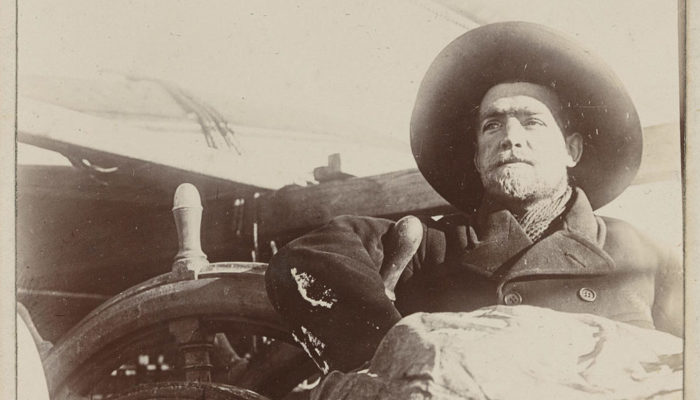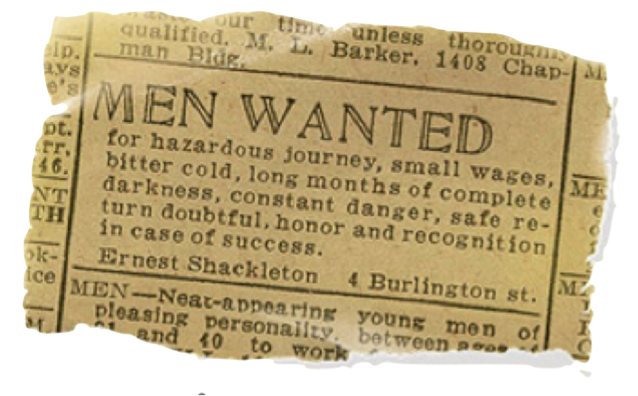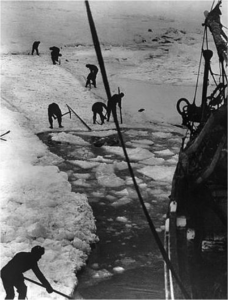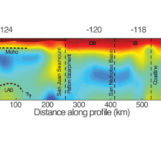
 A scientific career can be a struggle. This week Dave Stegman, Associate Professor at Scripps, draws parallels between being a scientist and being an Antarctic explorer.
A scientific career can be a struggle. This week Dave Stegman, Associate Professor at Scripps, draws parallels between being a scientist and being an Antarctic explorer.
He dangled in the crevasse, unable to touch the sides; the abyss beneath was hundreds of feet deep; the rope he was suspended from was 14 feet long, connected above to the sledge he had been hauling. Was it luck when his sledge happened to get wedged at the top of the crevasse instead of simply falling in after him, such as the fate of his companion Belgrave Ninnis a few days before? There was no need to yell for help, he was alone. Exhausted. Starving. This was the point at which Douglas Mawson contemplated ending everything. How did it get to this point? How would he get out? Like his contemporaries, Robert Scott and Earnest Shackleton, Mawson also reported one of the most incredible survival stories ever told.
To be a scientist means to be an explorer. As geodynamicists we operate in the space between the edge of human knowledge (new observations) and the frontier of human understanding (rigorous theories that explain and predict the data). Our explorations can visit the deep interiors of planets and moons and visit geological events that occurred billions of years ago. It’s not hard to find parallels between Mawson’s expedition and the personal journey of every scientist. Mawson had recruited about 10 others to join him in his perilous adventure, 3 of which would never return. Another famous Antarctic explorer, Robert Scott, left for the pole with 16 and only 11 returned. Why do people sign up for these things despite knowing there’s high risk and low reward (Fig. 1)?

Figure 1. Earnest Shackleton is said to have placed this advertisement in The Times and received hundreds of responses, although this is disputed. For some reason, whenever I see an advertisement for PhD opportunities, it reminds me of this. Credit Jaaziel.
Nearly every cohort of new PhD students shares an experience of having a member leave the program before completing their PhD. Even in the cases when all involved agree such a decision is correct, there are genuine feelings of loss amongst those left behind. The attrition awakens the most primal aspect of our beings: survival. It also affects the group’s morale. It happens again when some go on to be post-docs and some do not. The cohort continuing along an academic career path feels their numbers shrinking and again, the situation cannot escape being noticed by our primal instincts of survival. The longer an academic career, the more continual exposure one has to this cycle. We also begin to recognize a stochastic element in determining whose academic career evades an untimely demise and the random nature of the process is frightening because it is outside of our control. What also becomes clear is that the success factors, random as they are, tend to favour the group most similar to the dominant archetype of academia: the white male.
One can try to envision the fierce winds and blistering cold of an Antarctic blizzard, and having to decide between waiting it out while the last rations are consumed, or trying to push through in the whiteout. While we can imagine ourselves in their situation, those that deserve our true admiration probably don’t look much like Mawson or Scott. Consider the academic path to full professor. However perilous it may be, women and members of underrepresented groups are exposed to far more hostile conditions for their trek compared to others. How many of their steps were into deeper snow, how many faced faster gusts of bitter cold wind and endured a lonelier and more uncertain path riddled with more crevasses and hazards? For those few that successfully arrived, far more were lost along the way. Indeed, medals and awards would be deserved recognition for some, but only humility can recognize we don’t walk the same paths as others. The true victory will be creating the inclusive, supportive and encouraging community that everyone deserves.

Figure 2. Shackleton’s crew spent days and days on the incredibly difficult and equally futile task of trying to free their ship, the Endurance, from its frozen tomb. They watched as it was crushed by the ice and sank, stranding them. Is this a metaphor for trying to get some results from a geodynamic model and then submitting a manuscript, and getting smashed by peer review? Luckily for them, it was enough of a protracted disaster that the crew was able to save most of their provisions, including some of the whiskey. Credit Wikipedia
The expeditions of those first Antarctic explorers are celebrated as successes. Members of Mawson’s expedition claimed discovery of the first meteorite found on Antarctica. Scott’s expedition continued to haul 35 lbs of geological samples (rocks) well after having realized they were in a race for their lives with dwindling rations. Those rocks were found a few miles short of a cache of provisions that might have saved them. Historians postulate whether the extra burden contributed to their misfortune. These are extreme examples of the human cost of scientific exploration, and yet at some level, everyone is making a sacrifice for science. It is healthy to acknowledge and honour this sacrifice.
Although lives were lost, Mawson and Scott are still regarded as heroes. When Ninnis fell into the crevasse, Mawson and his remaining companion also lost 90% of their provisions. A modicum of planning for the worst, and not having all their eggs in one basket, would have changed their outcome entirely. They quickly depleted their rations, which forced them to make terrible choices: they consumed their dogs. Unfortunately, the dogs’ livers poisoned them and caused their bodies to literally fall apart. In the case of Scott’s expedition, his hubris took the form of bringing ponies to help pull the equipment; ponies with long stick legs on ice and snow couldn’t have been less suited to the task. What caused these renowned leaders to make such catastrophic mistakes? Were they seeking glory without giving suitable consideration to their crew’s welfare? Did blind ambition and ego contribute to gross negligence and wilful ignorance of how to best accomplish their goals? Is this much different from how early career scientists entrust their mentors with their fragile careers?
So why do we still pursue a scientific career in spite of knowing that the risks are great and the rewards are few, like the ad said? Because we are human and it is intrinsic to our nature to want to explore. Our curiosity compels us.
To summarize: the conditions are harsh, there will be mistakes, sacrifice, and loss, and our leaders aren’t always the heroes we thought they were. The fact is being a scientist is hard, and sometimes it will lead to a moment of dangling in a crevasse, metaphorically speaking. So why do we still pursue a scientific career in spite of knowing that the risks are great and the rewards are few, like the ad said? Because we are human and it is intrinsic to our nature to want to explore. Our curiosity compels us.
Further reading: https://www.bbc.com/news/magazine-25682462 https://www.smithsonianmag.com/history/the-most-terrible-polar-exploration-ever-douglas-mawsons-antarctic-journey-82192685/ https://www.smithsonianmag.com/history/sacrifice-amid-the-ice-facing-facts-on-the-scott-expedition-96367423/ https://mashable.com/2017/01/29/terra-nova-expedition/ National Geographic presentation on Mawson's Antarctic expedition: https://www.youtube.com/watch?v=7lkS5psgo6Q



